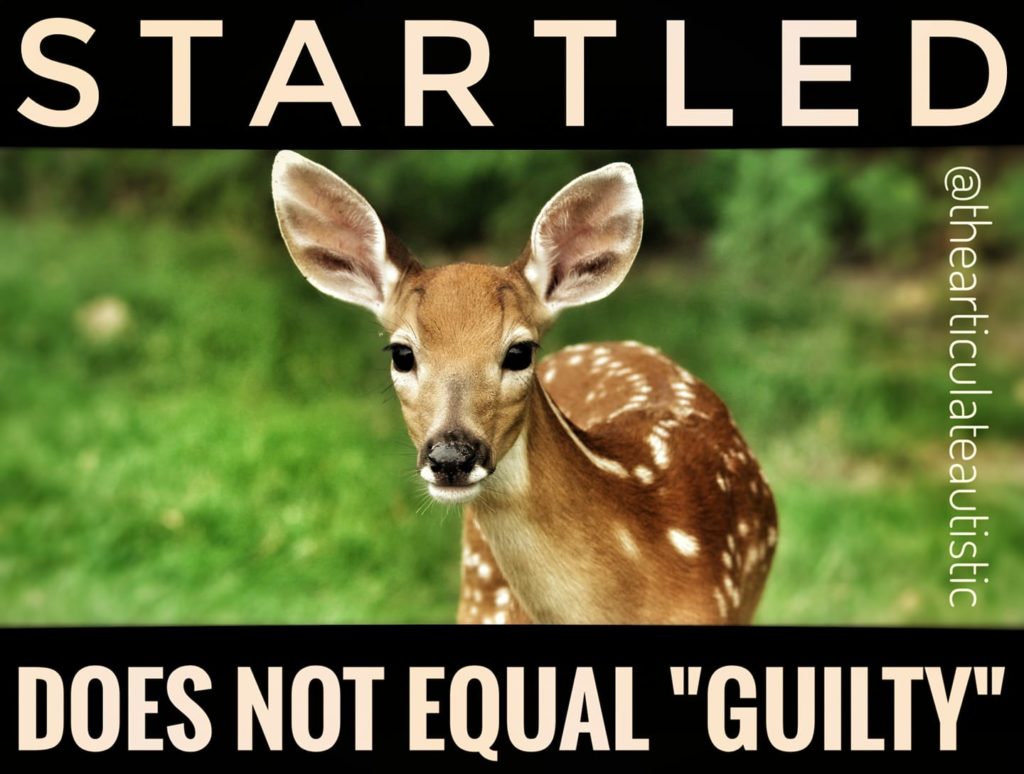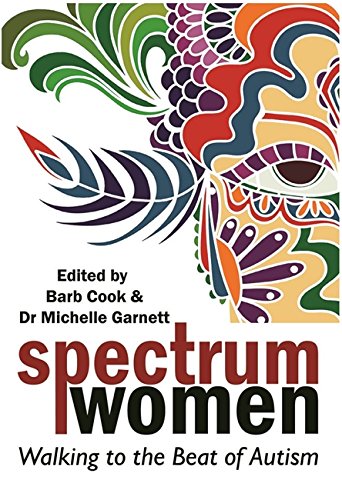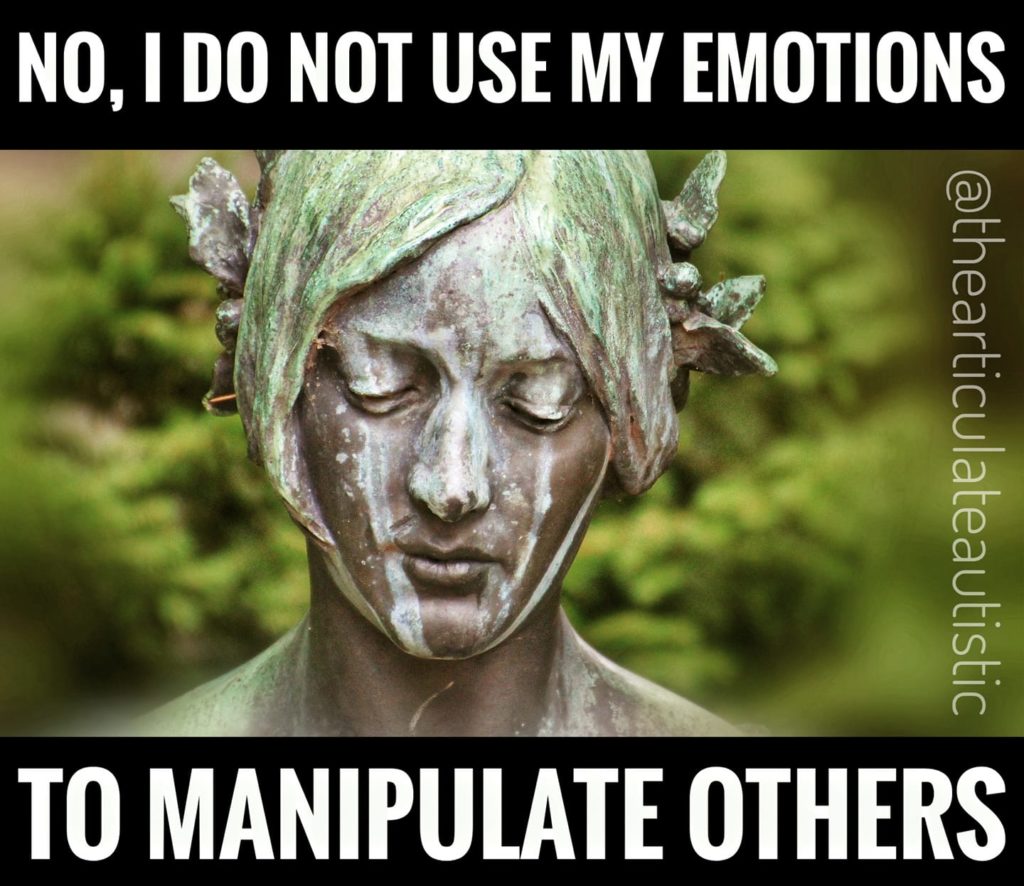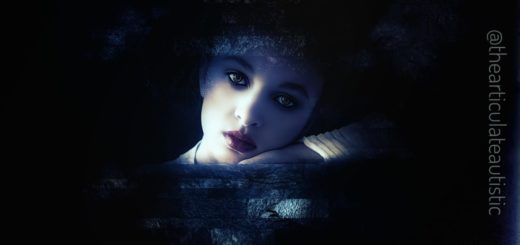Startled Does Not Equal “Guilty”

Most autistic people are on high alert often if not all the time. This means we startle easily and might stare at you in wide-eyed, mute terror simply because you walked into a room when we weren’t expecting it.
Unfortunately, and it took me learning this from an ex-partner, our startle reflex coupled with selective mutism (we may suddenly go non-verbal in response to stress, fear, sensory overload, triggers…) can look like guilt.
Meaning…
If you walk in on an autistic person and startle us, or if you ask us an unexpected question, or even if you raise your voice suddenly, we may get that “deer in the headlights” look.
– Jaime A. Heidel
You ever catch a neurotypical person trying to hide something, get caught in the act, and then get all wide-eyed and stammery?
Yeah, that’s not what’s happening with most autistics.
I’ve had it happen hundreds of times throughout my life that someone will start talking to me suddenly or ask me a question, and I will just go into a blank-eyed stare and not be able to speak. I may blush, swallow hard, and tense up.
(Article continues below.)
The best way to improve communication with your autistic loved one is to understand how your autistic loved one’s mind works! Intentions, motivations, and personal expressions (facial expressions or lack thereof, body language, etc.), are often quite different in autistic people than they are in neurotypical people.
Experience a better understanding of your autistic loved one by reading books about life from an autistic perspective as well as stories that feature autistic characters. You’ll have so many “Ah ha!” moments and start seeing your autistic loved one in a different light (and you’ll have a better understanding of their behaviors, which you may have been misinterpreting up until now).
Books I recommend for a better understanding of your autistic loved one:
This can read like guilty behavior to a neurotypical person.
If this is misunderstood to be the case with an autistic person, confronting us or asking rapid-fire questions in response to what you believe is guilt or an attempt to deceive you, we may have a meltdown or shutdown and accidentally “confirm” your incorrect belief that we are hiding something from you because you perceive our response as shame for being “caught”.
I believe this is another primary trigger for the development of PTSD. The fear and confusion that goes through us when we are suddenly interrogated after already being startled is almost indescribable.
With an autistic person (or someone with PTSD), a startle response to what you perceive to be ordinary stimuli may look like we’ve been caught doing something wrong, but we likely haven’t. Our nervous systems are just constantly in overdrive, and if you push us then, you run the risk of sending it (and us) off the proverbial ledge.
Most autistic people do not use their emotional responses to manipulate others. Our emotional responses are genuine and 100% in line with the amount of pain, confusion, and sensory overload we feel. Click on the photo below to read more about what’s happening when your autistic loved one gets very emotional.
Follow me on Instagram.
Want downloadable, PDF-format copies of these blog posts to print and use with your loved ones or small class? Click here to become a Patreon supporter!








Great blog! This gives me a lot of insight into my daughter’s (TSC/autism) past behavior re: appearing “guilty” and how that triggered people to respond. I remember many instances where she would just admit to whatever it was she was being accused of to shut people up, even if she hadn’t done whatever it was….the inquiry highjacked her system. I could always see it as her mother and could see the conflict within…like “maybe I DID do something?” and not really knowing what to do other than gentle support. This insight helps put some pieces together.
Thank you for sharing this, Jill. I’m so grateful that my writing has been able to help improve communication and understanding between you and your daughter. 🙂
Thank you so much for the insight! All my life (I was diagnosed with autism in my late 50’s) I have been honest to a fault. And yet many neurotypicals kept accusing me of being dishonest, deceitful, and generally untrustworthy. Some even tried hard to catch me in the act of doing something wrong. I couldn’t understand why so many were firmly convinced that I was a dishonest person. (A few years ago, a psychologist said I met nearly all the criteria for having PTSD, but he felt PTSD and autism were mutually-exclusive diagnoses. So he would not diagnose me with PTSD.)
As an autistic, my parents never knock when coming into my room, so they need to read this.